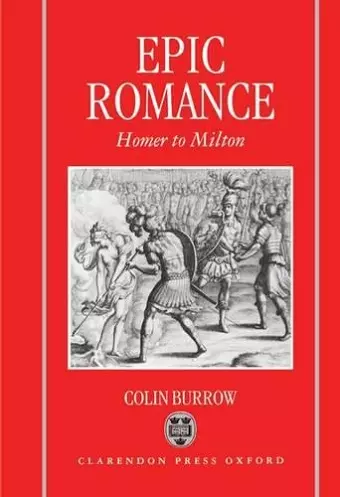Epic Romance: Homer to Milton
Format:Hardback
Publisher:Oxford University Press
Published:30th Sep '93
Currently unavailable, and unfortunately no date known when it will be back

Epic Romance: Homer to Milton presents a comprehensive view of the epic tradition from Homer, through Virgil, Ariosto, Tasso, Spenser, and the host of minor writers who helped create the idiom within which these writers worked, to the idiom within which these writers worked, to the indiviudal authors in historical context link to develop a powerful explanation of how and why the epic changed from Homer to Milton. Dr Burrow shows how the romance hero, whose prime motives are love and pity, emerged from a sequence of reinterpretations of Homer which runs from Virgil's Aeneid and its medieval redactions to Ariosto's Orlando Furioso. Relating the emergence of the romance hero to the digressive, decentred form of romance, the author explores how later writers sought to control the digressive energies of the romance hero and to create a language and form of heroism more like those of classical epic. This analysis leads to a fresh account of the way in which Renaissance writers responded to, and moved tentatively towards, the writing of the past. Arguing against the view that Ariosto, Tasso, Spenser, and Milton were engaged ina battle for mastery over their predecessors, Dr Burrow reveals how they transformed they received intrepreations of past epic in order to draw closer to the narrative forms of their classical forebears.
'It is a learned, informative, humane and stimulating study.' Times Higher Education Supplement
'but his reading of his subjects as correcting and developing suggestions in their predecessors' work is extremely thought-provoking' Times Literary Supplement
' ... important book ... Burrow has done us all a service, offering what is probably the first proper discussion, in a general study, of Fairfax's Tasso and Harington's Ariosto, as well as Drayton, Daniel and Cowley. What emerges from these richly exploratory chapters is that throughout the seventeenth century writers of epic were engaged in a series of transformations of past modes of heroism: This book requires the reader's closest attention, because of the density and complexity of its amterial and the very large number of texts which it digests. Not that it is particularly hard to read. Burrow wears his learning lightly, and the style rattles along cheerfully, allegreo ... there is much more to praise here than to criticise, and Burrow's book will take its place as a major contribution to its vast and much frequented subject.' K.W. Gransden, University of Warwick. Essays in Criticism. Vol XLIV No 3, July '94
There is much to welcome in a book which will be of particular use to Classical scholars interested in the Nachleben of the epic. Some of the readings in Homer seem authentically fresh and attractive ... the discussion of political epic in the early modern period, and of the politicization of epic in the English Civil War, is full of the kind of ideas which any interested reader would wish to digest and use. * The Classical Review *
Colin Burrow's book is stunningly good. * English Studies Vol 75 no 6 *
Dr Burrow's book tells a powerfully original version of a fascinating, but hitherto often obscure, story...Readers are urged to turn directly to Dr Burrow's eloquent and patiently erudite exposition. * RES New Series XLVII 185 *
Burrow's generally careful mapping of the emotions pity, fear, rage, and compassion from Homer to Milton is a refreshing approach in creating an alliance between epic and romance ... Burrow presents an even balance between primary texts and critical texts. Notes are rich and insightful, the bibliography is sound, and never at any point in the book do secondary sources swallow the argument. * Robert T. Behunin, Southern Utah University, The Ben Jonson Journal, Volume 2/1995 *
Burrow's generally careful mapping of the emotions pity, fear, rage, and compassion from Homer to Milton is a refreshing approach in creating an alliance between epic and romance ... Notes are rich and insightful, the bibliography is sound, and never at any point in the book do secondary sources swallow the argument. * Robert T. Behunin, South Utah University, Ben Jonson Journal *
ISBN: 9780198117940
Dimensions: 241mm x 161mm x 25mm
Weight: 540g
336 pages